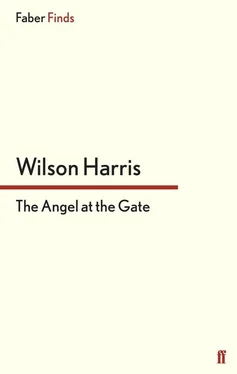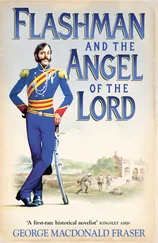He lived in a basement flat but would have preferred something above ground. It was all he could afford. He made coffee for Khublall and a pot of tea for himself.
“No sugar or milk for me,” Khublall said. It was a ritual observation that Jackson knew by heart.
They sat in a bare room, spare and upright chairs, lean polished table, a radio, a vase of flowers, a Flanders poppy that remained on its shelf all the year round. Jackson wanted it and kept the room like that. The only decoration was on the ceiling — a bird’s eye on Bale in a mist of faces. The room possessed an air of authentic, psychological casualty within the nature of things, the marginal conversion of casualty nevertheless into a quality of subjective being. To fall — and to know one has let the ball of ghostly power masquerading as history fall to the ground — is a capacity to leave a wound or scar in space, where the earth turns, to die with others who die and yet in continuing to live to see for them the stillness of death to which they are blind, individual grave, still gravity, still fall that goes on forever to unravel the mystery of truth.
“Yes, a bare room,” Jackson confessed. “Not that it makes me feel stripped of everything. But close to it, meaningfully close to it.” He was smiling and Khublall was nonplussed by such humour until he continued, “What’s the name of the old woman in a shawl who walks Shepherd’s Bush with everything that she has?”
“Mother Diver,” said Khublall, and suddenly he perceived Jackson’s smile against Mother Diver’s unsmiling comedy. It was as if something had flashed in a mirror, one unravelled face hidden in another. It left him puzzled but aware.
“The old woman has her shawl,” Jackson continued, “and I have my room. Who knows how each is located in the other? Sukey Tawdrey has her rag. Mother Diver has her shawl. One is music, one is fabric. I have my bone of a room. I toss my bone to them and they thread it subconsciously, unconsciously, into joint fabric, joint music….”
“In ancient times,” said Khublall, “the dead were buried with mutual charms, musical instruments, clothing, food, etc. I say ‘mutual’ because I’ve heard you use the word. I’m not sure — how do you see it, Jackson?”
“The burial of the dead mirrors the responsible imagination of the truly creative living. So I toss my bone of a room to be threaded into other rhythms, other things, until space sails…. That’s how I see it. The conversion of casualty that exists in each moment — the little deaths, the little births, that creep into and out of the world — so that what is inert or helpless is no longer helpless — space begins to sail and one’s life is not entirely wasted, some glimmer of wisdom takes one back, takes one forward…”
“Tell me then about Monmartre club in 1950. You stopped when we came in.”
Jackson’s eyes looked ravished again. He kept his voice rather low. “Sukey wasn’t her real name (it was Josephine) but she wore it like a badge of chimney grease or honky tonk; it was her black bone to toss around, her relic of honky-tonk music in the American South. She had grown up in the blare of honky-tonk bombast — music and battle for survival. When she came to Europe after the Second World War, she revived strip-tease Scott Joplin Rag. It was a defiant performance — a whittling away of honky tonk into a classical kind of gesture — she was tilting against the old South that may have lost the Civil War, may have been defeated over slavery, but was back in the saddle. Scott Joplin died in 1917, she was born in 1927 into a world of Jim Crow…. High time for another revolution to be backed up by a black Napoleon. I had come from Jamaica — just off the USA — that was her Corsica. Where better to find an emperor and a clown? Mind you, she was serious at first. Jamaica had already thrown up a Marcus Garvey who had paraded through New York City in military uniform. I was deficient in uniforms but as strong as a horse in those days and that’s as close as I came to an emperor, a horse for an empress to ride.” Jackson was laughing at the prospect of a horse that could rule a kingdom or republic with a woman in the saddle.
“That’s when I became a clown,” he confessed. “She wasn’t really appreciative of my joke and yet the thing is — you can never tell with a woman — I am sure she knew from the start I was a born casualty, strong and subtle, yes, a good horse beneath her in bed, but a casualty, a source of trouble, apolitical as all horses are.”
He was staring into space. “The truth is we came together because — though we did not see it then — the problems we faced were rooted in a kind of blockage in ourselves, in our one-sided natures that had grown bombastic. Sukey’s and Joplin’s word! And to become a creature of the furies — to be shorn of bombast — emperors had to regress into horses and through horses into clowns or daemons or angels. It was a regression to the womb as much as to the grave of power.”
Khublall was profoundly startled. Jackson had said he was deficient in uniforms but all at once it was as if he were clad in brilliant style that seemed to combine the mystery of the womb and the grave in the clown as well as the ambiguities of dress in Sukey Tawdrey’s strip-tease as she mounted him in bed.
There was a lull in the conversation. They resorted to common-or-garden tasks and replenished their coffee and tea, but Khublall was seized by the sensation of being sliced, half on earth, half on Bale, as if he were the creature of another and resided in her dreams or as if she resided in his. Was this part and parcel of the young woman he mourned? Was she — that young woman — part and parcel of another woman or other imaginary women in whom both Jackson and he existed as “prey of the furies”?
Jackson leaned upon him for support he knew as if the bone of space that divided them in punting the globe from hand to foot, foot to hand, drew many related presences in every continent, sea and air and land, into half-involuntary, half-voluntary cycle or circle or related dance and chorus of brothels as well as temples of history.
All this sharpened Khublall’s ears to Jackson’s confessions and disclosures. An ex-Hindu he (Khublall) sometimes dubbed himself. There were times when he perceived himself a father-confessor that the ex-priest Marsden would have understood in relation to the young men and women whose lives he assembled in the Inn. Stella, Mary, Sebastian, and the “no man’s land translator of Mary Stella Holiday’s automatic book of fictional lives”. There were times when Jackson seemed split, almost feminine in spirit — a curious transformation or involuntary humour this was in a man as male as he — as if the bird’s eye of Bale in its mist of painted faces on the ceiling of the room veiled him for an instant with a spark and a feather, womb-spark, beak like a feather within womb or brain. In the animal kingdom — Khublall reflected, staring at the ceiling — the male tended to wear brilliant colours like foetal, sometimes majestic, imperial blood, the female a drab or modest uniform. Whereas in the human kingdom, it was the woman who wore the gay and bright, seductive fashion, the male who tended to be plain. So, when Jackson seemed dressed for an instant in spark and feather he was animal-male in the animal kingdom but his bright adornment drew him down into ridden human-female in the human kingdom.
That Jackson therefore had confessed in veiled and adorned (therefore logically feminine) dress of words that he had been mounted and ridden by aggressive Sukey Tawdrey moved Khublall to perceive more deeply than ever the paradox of soberly clad (therefore logically animal-female) ex-priest, ex-Hindu, ridden by the funeral skull of god in Bale and in heaven, ridden by child-bride raised into exaggerated male beak or brain that pointed higher still through priest and convertible god, convertible maiden, into a dark womb-universe susceptible to human and spiritual re-birth in the very death— the very funeral of an age.
Читать дальше












